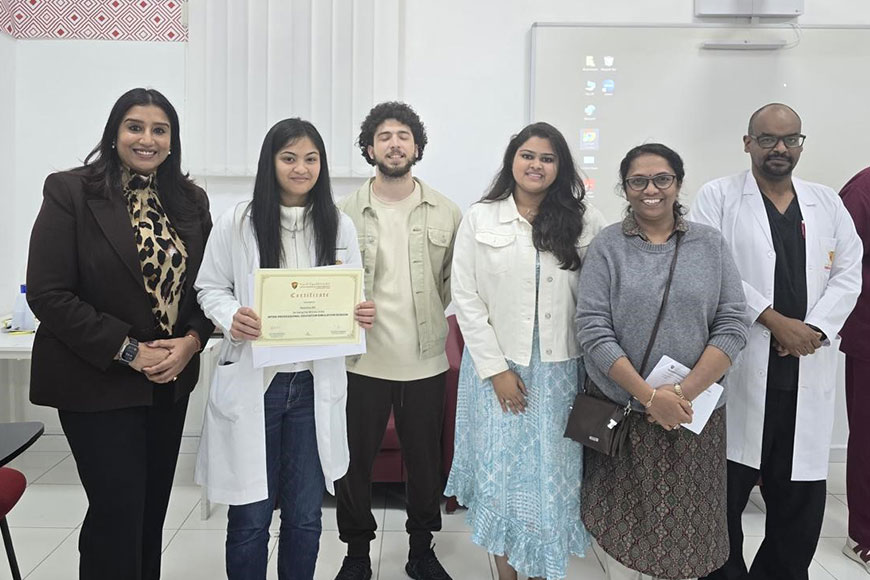CoHS faculty and students played a vital role in the IPE program, contributing their expertise and experience to enhance the learning experience for students from diverse healthcare disciplines.
Centre for Advanced Simulation in Healthcare (CASH) at Gulf Medical University successfully completed Phase II of the Interprofessional Education and Collaborative Practice (IPEC) program on February 14, 2025.

Rewarding Experience Interprofessional Education
Facilitators in the IPE program had the privilege of guiding and collaborating with students from diverse healthcare professions. This experience allowed them to foster a deeper understanding of teamwork and effective communication among participants. By creating an environment where each student could share their knowledge and perspectives, facilitators enhanced learning for everyone involved.
Professional Growth and Development
Dr. Renuka Devi Mahadevan Assistant Professor in Physiotherapy Program and facilitator for IPE program stated, “Facilitating the IPE program helped facilitators grow professionally, honing their leadership, organizational, and problem-solving skills. Witnessing students develop a sense of unity and respect for each other’s expertise was truly inspiring.”
Case Scenario: Mr. Abu Samad
The IPE program focused on a case scenario involving Mr. Abu Samad, a 68-year-old male with a history of smoking and Chronic Obstructive Pulmonary Disease (COPD). Following a road traffic accident, Mr. Abu presented with COPD exacerbation symptoms like shortness of breath, a productive cough with greenish sputum, and fatigue and a suspected maxillofacial injury. Mr. Abu also has hypertension and type 2 diabetes mellitus, managed with medication. Students from various disciplines from GMU, like College of Medicine, College of Dentistry, College of Nursing, College of Pharmacy, College of Health Sciences (Anaesthesia Technology, Physiotherapy, Medical Laboratory Science, and Medical Imaging Sciences) worked together in groups to manage Mr. Abu’s condition, demonstrating interprofessional assessment, comprehensive management planning, and patient-centered care.
The IPE program aimed to help students achieve the following learning objectives sequentially and professionally manage the patient as a teamwork:
| Learning Objectives: | Technical Objectives:
Non-Technical Objectives:
|
Students Reflection
Ms. Emaan Zahra (2022PT01) stated “I recently participated in an Interprofessional Education (IPE) activity, and it was an incredibly enriching experience. Collaborating with students from other healthcare disciplines, such as nursing, medicine, and occupational therapy, provided valuable insights into the roles and responsibilities of each profession.
As a physiotherapy student, I appreciated the opportunity to share my perspective on movement, rehabilitation, and patient mobility while learning how other disciplines approach the same case scenarios. The activity reinforced the significance of interprofessional collaboration in optimizing patient outcomes and addressing complex healthcare challenges.
One area for improvement would be to allocate more time for group discussions to delve deeper into case management strategies. Overall, this IPE activity was a fantastic learning opportunity, and I look forward to applying these collaborative skills in my future practice as a physiotherapist.
Mohammed Sherif (2022PT38) commented “As a third-year physical therapy student, I had the opportunity to participate in an interprofessional simulation exercise at the Center for Advanced Simulation in Healthcare. Initially, I felt quite nervous due to the new environment and the unfamiliar faces around me. My assigned group also seemed just as anxious. However, before the simulation began, there was a short icebreaker activity where we had to guess certain actors in movies and old popular music, that helped ease the tension and made us feel more comfortable working together.
Despite our initial nervousness, we gradually settled into our roles and communicated effectively.
As a physiotherapy student, my role was to suggest breathing exercises and mobility strategies to assist the patient’s recovery. It was interesting to see how each profession contributed to the case, and by the end of the scenario, our teamwork had improved significantly.
Dean, CoHS, Dr Praveen Kumar commented, “I am delighted to see our students and faculty come together to demonstrate the true spirit of interprofessional collaboration. The success of this IPE program is a reflection of our institution’s dedication to fostering a culture of teamwork, mutual respect and patient-centered care.”

